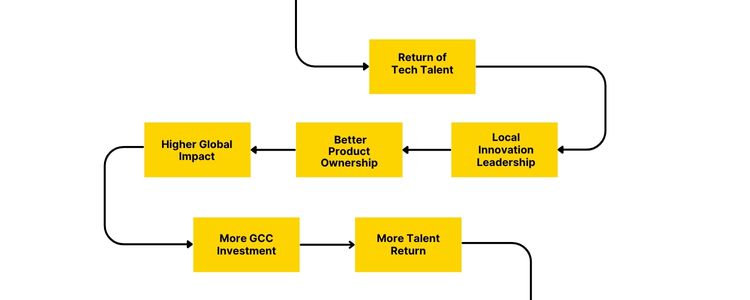
India is emerging as a global center for digital innovation, inspired by a rapid increase in global capability centers (GCCs) and global distribution centers (GDCs). India will cross 1,900 GCC, with more than 65% of its offshore development centers out of 500 companies. Which was once a destination for support tasks has now become a launchpad for global leadership roles, CXO pipelines, and innovation ecosystems. These centers are no longer back offices—they are strategic global innovation centers that provide AI, cybersecurity, product development, and data engineering capabilities for the world. For decades, the top Indian technical professionals moved abroad in search of better opportunities, from the early 2000s to the mid-2010s, the continued migration of talent towards Silicon Valley, London, Berlin, and Sydney continued. But now, this wave is turning. Thousands of Indian professionals, who once played leadership roles in Google, Microsoft, Amazon, or New York and London, are now returning home. Why? Because India is no longer a speed holding, it is leading global technological changes through the rise of global captive centers and global distribution centers (GDCs). These are no longer traditional back-office operations and are global innovation centers that are creating AI platforms. The equation has changed with India’s digital infrastructure, government support, improvement in lifestyle, and global compensation. This country has become a favourite destination for technical professionals looking for purposeful leadership.
In the past, professionals used to go abroad for many strong reasons: However, global disruptions and changes have created new challenges:
India has changed dramatically in the last five years.
This return is not a short-term trend. It is shaping the next stage of India’s global technology leadership.
The rise of global innovation centers in India is not just a structural change—it is a strategic victory for companies, the economy, and returning professionals. For Indian technical talents, meaningful tasks, leadership roles, family proximity, and global impact are no longer a dream abroad but a reality at home.
Inductus GCC provides the GCC services and believes that India’s reverse migration is the beginning of a new knowledge economy, where Indian minds lead global changes from Indian cities.
GCC is a strategic offshore unit that is established by a global company to manage important business functions, including product development, AI/ML, research and development, finance, and technical assistance in any other country like India. Many people are returning from abroad due to job instability, visa challenges, and rising living costs, and also because India now provides global-level roles in technical GCC and global distribution centers, as well as family and cultural benefits. Unlike traditional outsourcing, GCCs in India are now leading main innovation and global products with their own charter and not only implementation but also contributing to business strategy. They act not only as service centers, but also as global innovation centers. Yes, senior-level roles in technical GCC in India now offer equivalent packages of over US $100,000, including ESOP, bonus, and remote/hybrid flexibility, which makes them globally competitive. Bangalore, Hyderabad, and Pune are still prominent, while Tier-2 cities like Kochi, Indore, Coimbatore, and Ahmedabad are now attracting new global captive centers due to low cost and strong infrastructure. Aditi, with a strong background in forensic science and biotechnology, brings an innovative scientific perspective to her work. Her expertise spans research, analytics, and strategic advisory in consulting and GCC environments. She has published numerous research papers and articles. A versatile writer in both technical and creative domains, Aditi excels at translating complex subjects into compelling insights. Which she aligns seamlessly with consulting, advisory domain, and GCC operations. Her ability to bridge science, business, and storytelling positions her as a strategic thinker who can drive data-informed decision-making.
The “3 P” Effect Lens:
1) Push Factor: Why Were Indian Technical Professionals Going Abroad?
2) Pull Factor: Why are They Returning Now?
3. The Platform: What Does the Future Look Like?
Shift from Offshore Markets to India’s GCC Powerhouse
Parameter
Developed Markets (2020s)
India GCC Ecosystem (2024)
Compensation
High but eroding
Near parity in mid/senior roles
Job Security
Decreasing
Stable & expanding
Role Ownership
Limited in HQs
Full lifecycle ownership
Work Culture
Isolated
Hybrid, inclusive
Visa/Immigration
Uncertain
NA (home base)
Innovation Access
Centralised
India-led global R&D
Social & Family Life
Disconnected
Close-knit & purpose-driven
India's Growing GCC Economy

Conclusion
frequently asked questions (FAQs)

Aditi
Hey, like this? Why not share it with a buddy?
Related Posts
Recent Blog / Post
- Agile Methodologies for GCCs: A Blueprint for Success October 6, 2025
- The Legal and Compliance Checklist for a New GCC Setup October 4, 2025
- The Rise of Niche GCCs: A Focus on Specialised Capabilities October 4, 2025
- The Impact of Regulatory Changes on GCC Operations October 4, 2025
- Cybersecurity for GCCs: A Proactive Approach to Data Protection September 30, 2025
- Beyond Cost: Measuring the True ROI of Your GCC Investment September 29, 2025
- The Future of GCCs in the Retail Sector: A Strategic Playbook September 29, 2025
- David vs Goliath: Mid-Sized GCCs Quietly Outperform the Big Brands September 29, 2025
- Infineon’s Big Bet on India: Inside Its First GCC in GIFT City September 29, 2025
- From Campuses to Capability Centres: How Indian Universities Power the Global GCC Ecosystem September 29, 2025
- Retail Meets Digital: Costco’s GCC in Hyderabad Marks a Global Shift September 29, 2025
- The Silent Crisis: Why Many GCCs Plateau After 3 Years and How to Avoid It September 24, 2025
- Germany’s New Skilled Immigration Act and Its Ripple Effect on the GCC Talent Model September 24, 2025
- From Tokyo to Hyderabad: The Future of GCCs for Japanese Conglomerates September 23, 2025
- GCCs as AI Acceleration Hubs: Collaborating with US and Nordic Tech Majors September 19, 2025
















